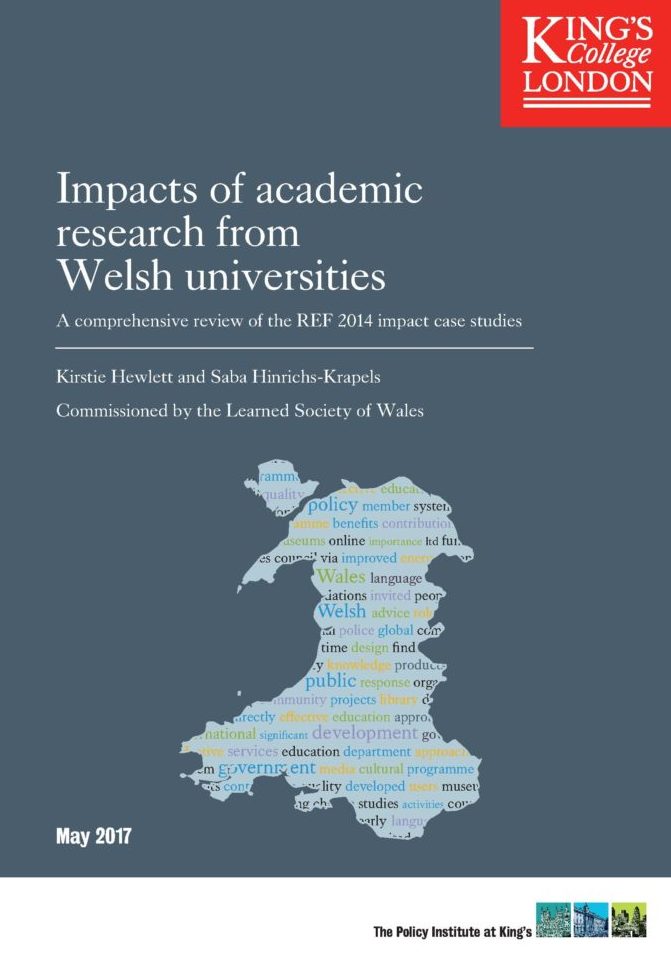The Societal and Economic Impact of Welsh Universities

A new report commissioned by the Learned Society of Wales captures the impressive research impact of Welsh universities to wider society and the economy. The King’s College London Policy Unit was commissioned as part of the Society’s mission to promote the advancement of learning and results of academic research in Wales.
Each year, many countries spend significant amounts of public funds on academic research. As with all public spending, it is important and necessary to demonstrate the impact and benefits of research carried out by Higher education. Every five years, the UK undertakes a systematic evaluation of university research – the Research Excellence Framework (REF), the largest research evaluation exercise of its kind anywhere in the world. The REF 2014 introduced impact as a measure to assess quality and value of research across UK Universities over the period of 2008– 2013. Impact was assessed through the submission of case studies using two criteria: reach – the influence or effect on the relevant constituencies, and significance – the intensity of the influence or effect.
In REF 2014, universities in Wales submitted 273 case studies. Despite constituting only 4% of the UK total, nearly 50% of Wales’s impacts from across all submissions were judged as 4* (outstanding) compared to a UK average of 44%. The new report will cover for the first time, all case studies submitted by a single country, and demonstrates the value that Welsh universities make with relatively small levels of research funding.
The analyses presented in this report are unique in that they cover every impact study submitted by a devolved country, and provides an in-depth insight into the types of research impacts arising within it, revealing the varied range of benefits to the economy, society, culture, policy, health, the environment and quality of life, within Wales, the UK and internationally.
Key highlights include:
- Relatively even distribution of case studies across the four main REF disciplinary panels: Life Sciences, Engineering and Physical Sciences Social Sciences, and Arts and Humanities.
- Most of the prominent impact topics from Wales were also seen in the full set of UK impact case studies.
- Common impact topic from Wales:
- ‘Informing government policy’
- ‘Parliamentary scrutiny’
- ‘Technology commercialization’
- ‘Media’
- ‘Regional languages of British Isles’
- ‘Health care services’
- the considerable international reach of Welsh impact involving 102 countries,
- a significant number of case studies showed local impact in the sectors of policy, society, culture, heritage, and education.
- 37% of the case studies reported impacts specifically in Wales and with impacts on policy and society, culture and heritage, economy, public education and social cohesion.
Research from Wales impacted on a wide array of beneficiaries including:
- Small and medium-sized enterprises (SMEs)
- A third of case studies submitted by HEIs described some form of commercialisation.
- Interactions with policymakers ranged from supplying evidence to select committees and briefing policymakers to drafting policies and strategies, lobbying and producing independent reviews.
- The beneficiaries of Welsh research identified as having more impact within Wales as compared to elsewhere included SMEs, policymakers, the third sector, education and the creative industries.
Commenting on the report, Prof Peter Halligan Chief Executive of the Learned Society of Wales said:
“Using novel text mining and qualitative analysis techniques, this detailed analysis of the 273 impact case studies from the 2014 Research Excellence Framework (REF) makes for an impressive and inspiring summary of how research from a small country can produce changes and benefits both internationally and regionally, impacting on culture, industry, on the preservation of languages, and local policy.”
The report can be accessed here